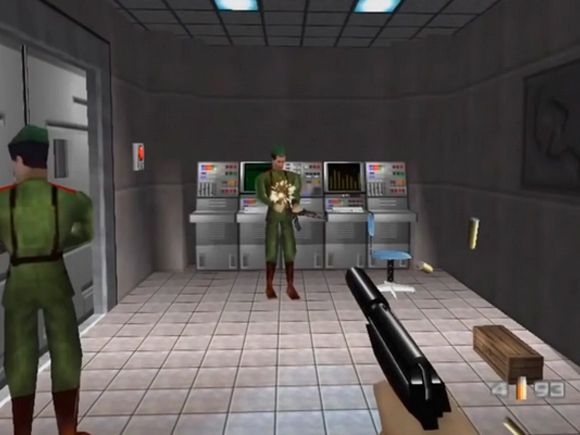Released in 1995, GoldenEye wasn’t just the first Bond film with Pierce Brosnan in the lead role; it was also the first made after the dissolution of the Soviet Union. Its plot is typical for post-Cold War action franchises: old Soviet weapons falling into the hands of dastardly, non-state actors. At the time, western storytellers were rooting around in the debris for antagonists and McGuffins, resurrecting the USSR as a conveniently formless, borderless minefield of leftover people and things, exploding into action due to some combination of regional grudges, rogue egos and greed.
Released two years later, the video-game adaptation of GoldenEye is, if anything, a more perfect encapsulation of this trend. Created by Twycross-based Rare Ltd—one of Britain’s oldest, best-loved game developers—it’s both a peppy, cameo-laden arcade blaster, played from the perspective of Bond himself, and a collection of mouldy Cold War exhibits: radar bases, silos and bunkers emptied of purpose but far from extinguished.
Playing GoldenEye 007’s new re-release on Nintendo’s Switch console, 26 years on, throws much of this into sharper relief. Sure, the same baleful, post-historical ambience is present in later military-themed first-person shooters, such as Call of Duty: Black Ops, but you feel it more in GoldenEye, thanks to the 3D graphics techniques of the mid-1990s: mottled flat surfaces suggestive of munitions rusting in storage; stagnant light and fog that evoke depressive February afternoons, regardless of which time zone Bond is meant to be in.
Above all, you feel it in the game’s predominantly Russian opponents, with their pasted-on photographic faces—not so much defenders as prisoners of the game’s worlds. In keeping with nameless Bond goons in general, they’re as comical as they are threatening, woodenly dipping to one knee before taking their shots, squawking and clutching at limbs theatrically when under fire.
If GoldenEye 007’s story and setting are part of the Cold War’s extended aftermath, its multiplayer features reflect another kind of transition. GoldenEye is one of the best-remembered “splitscreen” games—it let up to four people play together on a single N64 console with separate control pads, each player’s perspective taking up a quarter of the screen.
The limited nature of these quarter-perspectives intensified the mazelike feel of the game’s environments, sharpening the confusion as you struggled to isolate your own movements from everybody else’s. But the splitscreen functionality also allowed you to cheat, or “screencheat”, by spying on your opponents’ quadrants. Hated by some players to the point that they started taping cardboard partitions to their TVs, screencheating reflected the elbow-jogging intimacy of what is now called “local” multiplayer, which involves the space around the game as much as everything going on within it.

Splitscreen gaming is a fading tradition today, but a powerful and perhaps even radical one. It epitomises the idea that games are fundamentally to be shared, a commonplace that some videogames publishers have sought to erode for profit’s sake, in particular by shifting the emphasis from physical copies to downloadable games that can only be played by an account holder. It also created a culture in which memories of multiplayer games are also memories of specific people and places. I can’t detach my time with GoldenEye from thoughts of my N64-owning childhood friend and his brother, of their sitting room and the light through the window, the carpet under my crossed ankles. I didn’t have an N64 as a kid, so it’s only thanks to this friend that I’m able to remember GoldenEye at all.
I have fewer such memories of online games, and not just because they lack that cosy physical context. In the years since GoldenEye’s release, multiplayer in first-person shooters has undergone a transformation into an online “career”, with players amassing points from each skirmish to spend on what are essentially individualised workplace rewards—tasty new weapons, bonus character abilities or “perks”, and cosmetic features such as licensed costumes and gold-plated rifles.
Even with an accompanying slew of new ways to meet and bond with people over the net, this “professionalisation” of online multiplayer has rendered multiplayer less intimate, more abstract. It intersects with how internet culture in general has become a question of anti-social brand-building and self-curation, all of us Terminally Online and squabbling over status and identity markers of various kinds.
GoldenEye 007’s re-release on Switch is ironic, in a way, because the Switch—launched in 2017—was supposed to turn back the clock a little. Early editions of the console offered detachable pads and a kickstand, allowing you to prop up the machine and play splitscreen anywhere, a genuinely magical idea. Sadly, Nintendo has taken this functionality away from many later editions. And, going by conversations I’ve had with developers, the Switch hasn’t sparked any kind of splitscreen revival: online play is simply too ubiquitous at this point for local multiplayer to be worth implementing. GoldenEye on Switch at least retains its splitscreen features, but you’ll need to buy an online Nintendo subscription to download the game in the first place.
Once the defining example of a first-person shooter, GoldenEye 007 appears today as another Soviet-era artefact, eerily reactivated at a time of heightened hostility between Russia and its western neighbours. There’s a tendency when covering re-released games to talk about “how far we’ve come”, redefining the old game as the faintly embarrassing prelude to the latest cutting-edge titles, which will in turn be redefined as faintly embarrassing preludes to whatever we’re playing in decades to come. This thinking risks disregarding both what the game meant at the time and what it means to reinvent it as a “new” project. Indeed, with GoldenEye, we’d do better to talk about how much we’ve lost.












